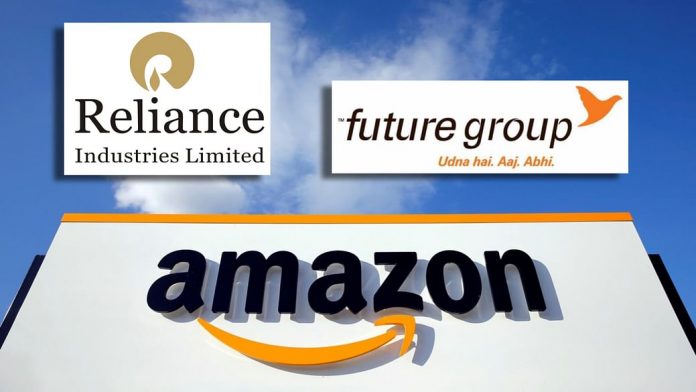This article has been written by Sukeshi Singh.
Table of Contents
Background
Amazon NV Investment Holdings and Future Coupons Limited
In the month of November 2019, global e-commerce giant, Amazon NV Investment Holdings (“Amazon”) had acquired 49% (forty-nine percent) equity stake in Future Coupons Limited (“Future Coupons”) which is a promoter group entity of Future Retail Limited (“Future Group”). The deal was worth approximately Rs. 2000 Crores. Future Coupons held 7.3% (seven point three percent) stake in the Future Retail, which meant that pursuant to the deal, Amazon would hold 3.5% (three point five percent) stake in Future Retail indirectly. The main reason behind Amazon’s investment in the Future Coupons was to expand the retail business in India by synergizing the two businesses, i.e., merging Amazon’s technology with Future Groups’ supply chain efficiencies and inventory. The 15,000 (fifteen thousand) grocery stores owned by the Future Group, were to be used as fulfillment centres by Amazon to timely deliver groceries in tier-1 and tier-2 cities. The deal allowed Future Retail to place its products on Amazon’s online market-place and release debt burden on the company, which was approximately Rs. 3,000- 3,500 Crores at the said time.
Main Highlights of the Deal
- Call-option: Amazon was given a call-option which could be exercised from 3rd year onward till the 10th year of the agreement, to acquire all or part of Future Coupons shareholding in Future Retail.
- Restricted Companies/ Competing business clause: The Agreement specified 15 (fifteen) companies, including Reliance Industries, Walmart, Alibaba, Softbank, Google, Naspers, eBay, Target, Paytm, Zomato and Swiggy, which were barred from investing/ buying stakes in Future Group’s retail assets.
Future Group and Reliance Industries Limited
The retail business of contributes towards about one-fourth of Reliance Industries Limited (“Reliance”) total revenue. In the Annual General Meeting of Reliance, 2020, Mukesh Ambani had first expressed the intention of inducing partners to expand Reliance Retail and initiating initial public offering for Reliance Retail in the coming years. Pursuant to which, in August 2020, Mukesh Ambani’s Reliance Industries Limited bought retail and wholesale business and the logistics and warehousing businesses of Future Group as a going concern on a slump sale basis for a lump sum aggregate consideration of Rs. 24,713 Crores. Through the deal, Reliance acquired Future Retail that owned Big Bazaar, fbb, Foodhall, Easyday and Nilgiris, Future Lifestyle Fashion Limited that operates Brand Factory, a fashion discount chain and Future Consumer Limited. However, Future Groups’ financial and insurance businesses were not a part of the deal. The main reason behind Reliance’s investment in Future Group was to expand offline retail presence and improve margins by creating economies of scale.
Deal Structure:
- Part 1: Merging of listed entities, i.e., Future Retail Ltd., Future Lifestyle Fashions Ltd., Future Consumer Ltd., Future Supply Chain Solutions Ltd. and Future Market Networks Ltd. into Future Enterprises.
- Part 2: Future Enterprises, by way of a slump sale shall transfer the retail, wholesale and warehousing business to Reliance Retail and Fashion Lifestyle Limited, a wholly owned subsidiary of Reliance Retail Ventures Limited.
- Part 3: Reliance Retail and Fashion Lifestyle shall invest Rs 1,200 crore in a preferential issue of shares and Rs 400 crore towards warrants of Future Enterprises. These investments were done to reverse the adverse effects of Covid-19 pandemic on Future Groups business.
It is pertinent to note that, Future Group had lost Rs. 7,000 Crore of revenue during the first 4 (four) months of the pandemic and sale of business was a consequence of the loss of revenue owing to the pandemic which engulfed the world. Future Group is not the only company being forced to sell its business due to Covid-19 outbreak, the trend is being observed worldwide. There is a global resurgence in mergers and acquisitions presently.
Legal issues arising after sale of business by future group to Reliance
Singapore International Arbitration Centre (SIAC):
In the month of October, 2020, Amazon filed a case for emergency arbitration against Future Group for forging an alliance with Reliance to sell Future Group’s retail, wholesale and logistics business without Amazon’s consent, which was required according to an agreement signed between Future Group and Amazon in the month of August, 2019.
Amazon contended that the deal between Future Group and Reliance was invalid as it was violative of the agreement signed between Amazon and Future Coupons in 2019. According to Amazon, the deal interfered with Amazon’s call option to buy Future Coupons’ stake in Future Group, which could have been exercised from the third anniversary of the agreement to the tenth anniversary and at the same time, the deal was also in contravention of the competing business clause in the agreement, which specifically mentioned Reliance as a restricted company for the purposes of investment in Future Group.
The Singapore arbitrator ruled in favour of Amazon and passed an interim relief by putting a stay on Future- Reliance deal, which was primarily for 90 (ninety) days but later was extended. Pursuant to this, Amazon approached, Competition Commission of India (“CCI”) and Securities Exchange Board of India (“SEBI”). It also approached Delhi High Court to enforce the arbitration order and prevent the Future- Reliance deal which was upheld by the Delhi High Court. Consecutively, Future Group appealed to the Singapore arbitrator to exclude Future Retail from the interim order passed.
Justice Midha, Single Judge Bench, Delhi High Court
On February 2, 2021, Justice Midha, Single Judge Bench of Delhi Court, upheld the order passed by the Singapore arbitrator stating that the emergency arbitrator is an arbitrator for all the intents and purposes under Section 17(1) of Arbitration and Conciliation Act, 1996. It imposed costs on some Future Group companies and directors after holding them guilty of willful violation of the emergency arbitrator’s order in favour of Amazon. It had directed them to deposit the amount in Prime Minister’s Relief Fund within two weeks of the order, for being used for providing Covid-19 vaccination to senior citizens of Below Poverty Line (BPL) category of Delhi. The Court found the emergency arbitrator’s order to be valid and capable of being enforced in India. The Court put a stay on the deal and ordered that no action, in violation of the arbitration order should be taken. It specifically decided to attach assets of Future Retail, Future Coupons, Kishore Biyani and others and issued a show-cause notice to Kishore Biyani. Justice Midha had ordered a status-quo, effectively putting the sale of retail assets by Future Retail to Reliance Retail on hold.
Division Bench, Delhi High Court
The order of the Single Judge Bench was appealed to the Division Bench by Future Group, and the Division Bench stayed the order passed by Justice Midha pertaining to staying the Future- Reliance deal and attaching assets of Future Group and Kishore Biyani. Through an interim order on February 8, 2021, the Court recognized that Future Retail was not a party to the arbitration agreement between Amazon and Future Coupons. The Division Bench found that Amazon had significant control over Future Group which was a violation of provisions of Foreign Exchange Management Act, 1999.
Such control was a result of 3 (three) consecutive agreements signed between Amazon and Future Group. The Delhi High Court analysed the clauses of three agreements—Future Retail’s shareholder’s agreement with Future Coupons, Future Coupons shareholder’s agreement with Amazon and Future Coupons share subscription agreement with Amazon. Read together, the Court held that the covenants prima facie transgress from a protective right to a controlling right in favour of Amazon. Such controlling right was in contravention of the Foreign Direct Investment Policy for multi-brand retail which permits foreign investment of up to 51% (fifty-one percent) only under the government approval route.
Supreme Court of India
Amazon approached the Supreme Court to appeal against the Division Bench’s order reversing the status-quo order by the Single Judge. Supreme Court did not vacate the stay passed by the Division Bench, but it passed an interim order asking National Company Law Tribunal to not sanction the scheme of amalgamation. The bench made it clear that the Division Bench of the Delhi High Court shall not proceed with the case since the Supreme Court had admitted the matter for examination.
Conclusion
As of now, the matter is posted for hearing before Supreme Court on April 27, 2021. However, if the deal between Future- Reliance does not go through, Future Group will have no option, other than to shut down the shutters which will result in a loss of 11 (eleven) lakh jobs and around 6,000 (six thousand) vendors/ suppliers will lose their business. If the deal falls through, it would be a loss of Amazon’s investment as well as then Future Group would become bankrupt. Most likely, the Apex Court’s judgment will be based on the principle of business efficacy, which would conform with the commercial common sense of the situation, to provide a structured solution which would be just and benefit all involved parties.
LawSikho has created a telegram group for exchanging legal knowledge, referrals and various opportunities. You can click on this link and join:
 Serato DJ Crack 2025Serato DJ PRO Crack
Serato DJ Crack 2025Serato DJ PRO Crack











 Allow notifications
Allow notifications


